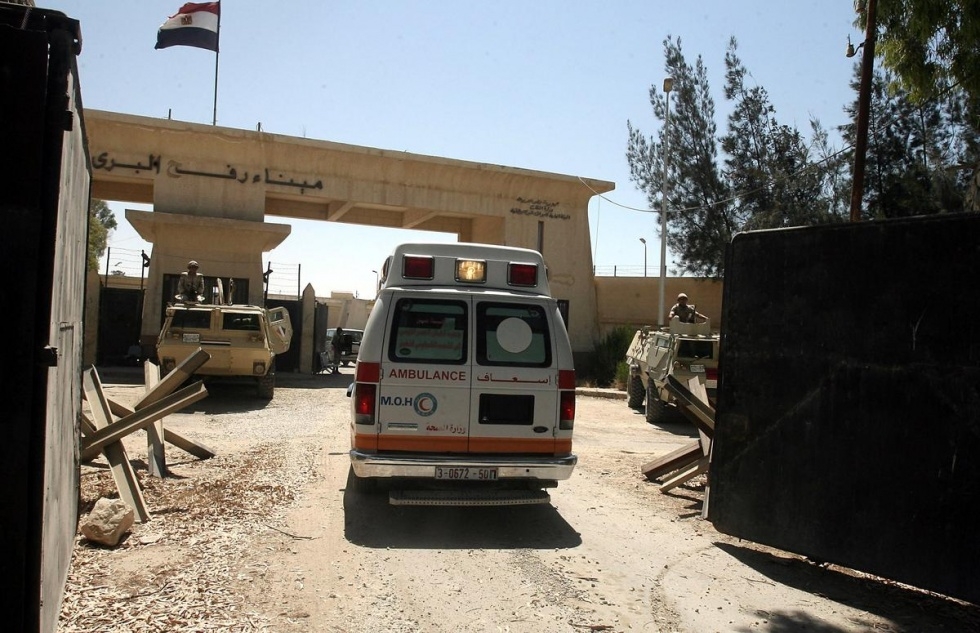Rafah open, but crossings slow, selective

GAZA CITY - The hostile relationship between Egypt and Hamas is unlikely to make Egypt broker a ceasefire or offer much in terms of facilitations. Egypt opened the Rafah border crossing, largely closed since Morsi was ousted, to allow injured civilians through from Gaza. Egyptian President Abdel Fattah al-Sisi made the decision after the United Nations asked Egypt to re-open the border.
However, there are caveats: the crossing is only open for Egyptian nationals - meaning those whose parents are both Egyptian citizens - living in Gaza, injured Palestinians and medical supplies, according to Palestinian Border Control officials and Egyptian authorities.
It seems that even the injured are having trouble getting through: on Thursday, Egyptian authorities only allowed in "a few" injured people, and three buses of Egyptian nationals, according to Maher Abu Sabha, Director General of Gaza crossings.
Late Thursday, a group of 10 Gazans, injured Wednesday evening in a Khan Younis beachfront café while watching the Netherlands vs. Argentina World Cup game, still waited for ambulances to transport them through the crossing. Not all ambulances with injured people went through on Thursday, said an official at the Rafah crossing Operation Room who preferred to remain anonymous.
Meanwhile, the Palestinian Interior Ministry says thousands others are registered to travel, but are not being allowed through the supposedly ‘open’ border.
On Wednesday, despite uneasy relationships between Hamas and Egypt, Foreign Ministry Spokesman, Badr Abdel Aaty, expressed Egypt’s concern over the escalation of violence in Gaza.
In a press release, Abdel Aaty called on both sides to show more restraint and refrain from further violence. He warned against complicating the situation which he said would make a return to negotiations difficult.
In previous wars, Egypt played an important role in mediating ceasefires between Israel and Palestinian resistance, an influence which has seemed to taper since al-Sisi has come to power.
According to a source within Hamas, Abdel Aaty's message was received as "a warning that Israel would wipe parts of Gaza off the map.”
"This is not the message that Hamas was waiting for,” the source said. “Egypt has been brokering previous ceasefires - they should have made sure to pressure Israel to release all prisoners in the October 2012 prisoner exchange deal."
The Egyptian government has accused Hamas of aiding militants to cause riots in Sinai, an allegation which Hamas has refused. Many of the tunnels, which were once a main source of revenue for the de facto government, have been destroyed.
In 2011, Egypt took credit for brokering the prisoner exchange in which 1,027 Palestinian prisoners were released in return for Israeli soldier Gilad Shalit who had spent five years as a captive.
During the recent Israeli bombing of Gaza, the border crossing at Rafah has been mostly void of any security personnel or staff members. At night, Rafah border is a no-reach area.
Even in the daytime, the crossing can be a foreboding place for those trying to cross, said Abed Afifi, a cameraman shooting footage at the Rafah crossing said on Thursday.
"Israeli drones are hovering overhead and Israeli tanks continuously shell nearby,” Afifi said.
Hundreds of foreign passport holders from Palestinian origin stood at the gate of Rafah in hopes that they could evacuate Gaza. They left when Egypt announced the border was closed again. Thousands of cases of students and workers from abroad with nearly expired residence permits are also stuck in Gaza.
Usually, Rafah is open once every two weeks allowing people to travel through for Umrah (pilgrimage) into Saudi Arabia. This came after the Saudi government put pressure on Egypt not to ban those doing Umrah or Hajj.
Among those transferred Thursday morning was Mohsen Kaware who sustained critical spinal injuries after an Israeli missile hit his house in Khan Younis, one of the first attacks since the escalation of violence that started on Monday. The air strike killed at least seven people and injured 20 more civilians.
Hamas political chief Khaled Meshaal appeared on Al Jazeera on Wednesday saying that he is seeking help from Arab nations, most importantly the Egyptian armed forces.
"We are waiting for Egypt's great army [to respond]," Meshaal said.
Meanwhile, Abu Sabha of the border crossings said that he has not been informed by Egypt if the border will be open again Friday for the thousands stuck in the costal enclave.
Stay informed with MEE's newsletters
Sign up to get the latest alerts, insights and analysis, starting with Turkey Unpacked
Middle East Eye delivers independent and unrivalled coverage and analysis of the Middle East, North Africa and beyond. To learn more about republishing this content and the associated fees, please fill out this form. More about MEE can be found here.



